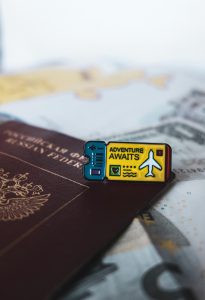So, you’ve landed an internship in beautiful Spain! Imagine soaking up the sun on your days off, indulging in delicious tapas, and maybe even mastering the art of the siesta. But wait! Before you start packing your bags and practising your Spanish, there’s one tiny detail to handle first: your visa… Getting a Spanish internship visa may seem like a daunting task, but do not worry! This guide is here to walk you through every step on how to obtain an internship visa, especially if you’re heading to Barcelona, one of the most popular internship destinations in Spain.

1. Understand Your Visa Type: The Basics
First things first, let’s get our heads around which visa you need. As an international student, your visa requirements will depend on your home country. For students from outside the EU or EEA, you will likely need to apply for a specific visa if your internship in Spain lasts more than 90 days.
If you’re from the UK, you’ll need an Internship Visa to work in Spain, especially post-Brexit. Without this, you won’t be able to legally work during your internship. But don’t worry, the steps below will guide you through the process.
2. Gather Your Documents: The Paper Chase Begins
Before setting off on a Mediterranean adventure, it’s essential to get organised. Here is a checklist of the documents needed for the Internship Visa application:

- Authorisation of Residence for Internship Permit: This document is essential for obtaining the visa. It is recommended to seek legal assistance from a Spanish lawyer for this part, as the process can be complex.
- Full passport: A copy of the entire passport, from the front page to the back page, will be required.
- Academic Certificate: A letter from the university confirming the student’s registration and degree program. This document must be legalised and translated into Spanish by a Sworn Translator.
- Private Health Insurance: Proof of health insurance that covers the entire duration of the internship, which also needs to be translated into Spanish.
- Proof of Financial Means: Evidence of sufficient funds to cover living expenses in Spain. For a 12-month internship, approximately 7,500 euros is required. Bank statements must be signed and stamped, and translated into Spanish.
- Proof of Internship (Convenio): An agreement signed by the student, university, and internship provider outlining the role, duration, and confirmation that it is part of the educational program.
- ACRO Certificate: A criminal record certificate that must be legalised and translated into Spanish.
The process of obtaining the Authorisation of Internship generally takes around 30 days, so if you’re interning in a city as bustling as Barcelona, plan ahead to ensure everything is ready in time.
3. Book Your Appointment for your actual visa: The Countdown Begins

Once the Authorisation for Internship is received, the next step is to book an appointment with the nearest Spanish consulate. It’s recommended to book early, as appointments fill up quickly.
These are the documents you need for your Visa appointment:
- National Visa Application Form. This form can be downloaded from the Spanish Consulate’s website. Fill it out carefully, and make sure all information matches your supporting documents.
- Valid Passport. Your passport must be valid for at least 12 months and have at least two blank pages for the visa. Bring the original and a photocopy.
- Recent Passport Photos. You’ll need a recent passport-sized photo with a white background. No hats, glasses, or funky hairstyles – save those for the holiday snaps!
- Authorisation for residence and Internship. This is the work authorisation that was mentioned above. Bring the original and a copy.
- Proof of residence. A document showing the applicant’s address, such as a bank statement.
- Proof of Financial Means. You need to prove that you can support yourself financially while in Spain. This can be done with bank statements showing sufficient funds, a scholarship letter, or a letter of financial support from a parent or guardian.
- Medical Certificate. A medical certificate proving good health, which needs to be legalized and translated into Spanish.
- Criminal Record Check Certificate. The ACRO certificate, which must be issued within the last three months, also needs to be translated and legalized.
4. Do You Need an Internship Visa If You’re from Europe?
If you’re from a European Union (EU) or European Economic Area (EEA) country, or Switzerland, the good news is: you do not need an internship visa to work in Spain! Thanks to the free movement of people within the EU, you can live, study, and work in Spain without needing a visa, even for internships. Barcelona, with its international flair, is a top destination for European students, and the process is much easier for EU/EEA nationals.

However, there are a couple of formalities you should keep in mind:
- Register with the local authorities: If your stay in Spain exceeds 90 days, you’ll need to register at the local town hall (Ayuntamiento) and obtain a Foreigner’s Identity Number (NIE). This number is essential for working, opening a bank account, and other official matters in Spain.
- Health Insurance: Ensure you have valid health insurance. Your European Health Insurance Card (EHIC) (or Global Health Insurance Card (GHIC) for UK citizens) will typically cover necessary healthcare during your stay in Spain.
In summary, while you don’t need a visa if you’re from the EU/EEA or Switzerland, it’s crucial to follow these steps to be fully registered and legal during your internship in Barcelona or anywhere in Spain.
5. For UK Students: Getting Your Internship Visa
Since Brexit, UK students now need to navigate slightly different visa regulations when pursuing internships in Spain. Here’s how to get your visa as a UK citizen:
- Authorisation of Residence for Internship Permit: As mentioned earlier, this is a key document. UK students must ensure that they have secured this before moving forward with their visa application. Hiring a Spanish lawyer to assist with this step is highly recommended due to the complexity of the process.
- ACRO Certificate: A criminal record certificate is necessary, and it must be legalized and translated.
- Proof of Health Insurance: Private health insurance is mandatory for your stay, and this too must be translated into Spanish.
- Financial Proof: Ensure you have sufficient funds to support yourself throughout your internship, as outlined earlier. Bank statements or financial guarantees from sponsors will suffice.
You’ll then need to book an appointment at one of the Spanish consulates in the UK (London, Manchester, or Edinburgh). At your visa appointment, bring all the documents listed above.
6. Waiting Game
After your appointment, it’s time to wait for your visa to be processed. Processing times can vary, but it usually takes between 15 and 30 days. This is the perfect time to start planning your adventures in Barcelona. Create a bucket list of places you want to visit, start learning some basic Catalan phrases, and maybe brush up on your paella cooking skills!
but it usually takes between 15 and 30 days. This is the perfect time to start planning your adventures in Barcelona. Create a bucket list of places you want to visit, start learning some basic Catalan phrases, and maybe brush up on your paella cooking skills!
7. Visa Collection: The Golden Ticket
 Once your visa is approved, you’ll need to go back to the consulate to collect it. Double-check the details on your visa – make sure your name is spelled correctly, and the dates match your internship. This little sticker in your passport is your ticket to the Spanish adventure you’ve been dreaming of!
Once your visa is approved, you’ll need to go back to the consulate to collect it. Double-check the details on your visa – make sure your name is spelled correctly, and the dates match your internship. This little sticker in your passport is your ticket to the Spanish adventure you’ve been dreaming of!
As you prepare to kickstart your internship journey in Barcelona, remember that all the paperwork and planning are just stepping stones to the incredible experiences that await you in this vibrant city. From exploring the historic streets of the Gothic Quarter to unwinding on Barceloneta Beach after a productive day at your internship, Barcelona offers the perfect blend of professional growth and unforgettable memories. So, get your documents in order, pack your sense of adventure, and get ready to make the most of your time in one of the most exciting cities in Europe. We can’t wait to welcome you to your new home away from home!



